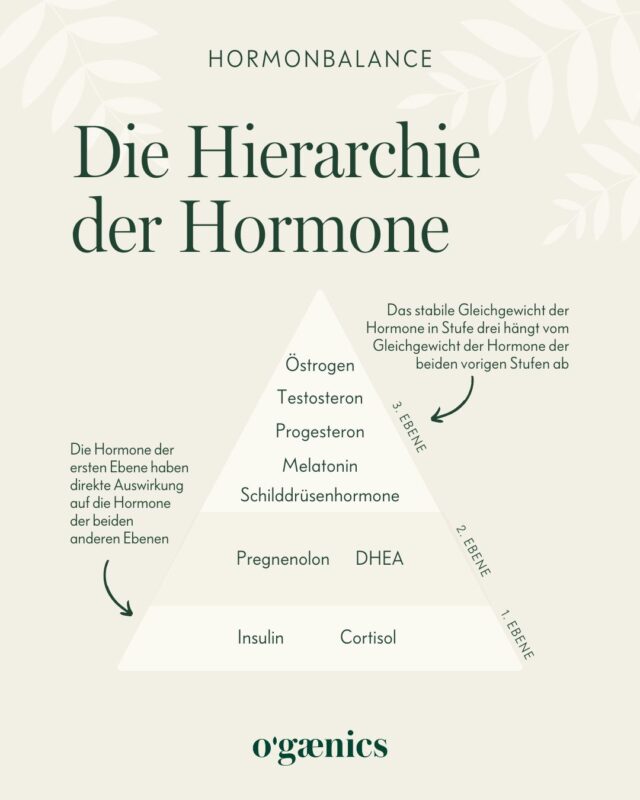Learn how to balance your hormones and improve your well-being.
Your hormones play a central role in your body and influence almost every bodily function. In this blog article, we take a detailed look at the hierarchy of hormones that are crucial for hormonal balance and overall health.
What are hormones?
Hormones are messenger substances. These are the body’s own substances that pass information between cells. They are produced by special cells in glands and tissues of the endocrine system. These messenger substances are released into the bloodstream and transported to the areas of the body where they are supposed to have an effect. Hormones play a central role in the regulation of numerous bodily functions, including:
- Metabolism and energy balance
- Growth and development
- Reproduction and menstrual cycle.
- Mood and behavior
- Stress reaction
To ensure that the hormones can efficiently control the processes in the body, their quantity is precisely adjusted to the respective requirements. For example, insulin, the hormone that regulates blood sugar levels, is released after a meal in exactly the right amount to compensate for the rise in blood sugar and transport the glucose efficiently into the body’s cells.
The hormonal balance in the human body is a fascinating and complex system that is influenced by numerous key hormones. These hormones interact in a hierarchical structure, with each hormone playing a specific role and having an effect on other hormones and bodily functions.
Why is it not possible to establish a hormonal balance in the upper level if the lower level is disturbed?
The hormone hierarchy works like a finely tuned clockwork mechanism, in which each level builds on the others. An imbalance in the first level can lead to a chain reaction that affects the entire hierarchy. If our body is constantly confronted with increased cortisol and insulin levels, the other levels react accordingly. Thyroid hormones can become unbalanced, the sleep-wake rhythm can be disturbed and reproductive problems can occur.
Trying to correct an imbalance in the upper levels without addressing the underlying causes in the first level is like patching a leak without fixing the faucet. It may work temporarily, but in the long term the problems will persist until the root causes are addressed.
Below you can find out more about this hierarchy of hormones and how they influence health and well-being.
1st level: The basic hormones
Our hormonal balance depends largely on a few key hormones that influence everything else. The two hormones cortisol and insulin form the foundation for your health and any hormonal balance, from thyroid to reproduction and menstrual cycle.
Cortisol: the stress hormone
Cortisol is a vital hormone that is produced by the adrenal glands and plays a central role in stress management. It is often referred to as the “stress hormone” because it is released in response to stressful situations. Cortisol helps the body to deal with stress by regulating energy levels, reducing inflammation and increasing blood pressure.
Effects of elevated cortisol levels
However, a chronically elevated cortisol level can lead to numerous health problems:
- Disturbed sleep-wake rhythm: A high cortisol level can impair sleep by making it difficult to fall asleep and reducing the quality of sleep. This can lead to exhaustion and concentration problems.
- Weakened immune system: Long-term stress and elevated cortisol levels can weaken the function of the immune system, increasing susceptibility to infections.
- Increased insulin resistance: Too much cortisol can reduce the cells’ sensitivity to insulin, which increases the risk of developing type 2 diabetes.
Measures to lower the cortisol level
Effective measures to reduce cortisol levels include:
- Stress-reducing techniques: Practices such as meditation, yoga and mindfulness exercises can help to lower cortisol levels and improve overall well-being.
- Adequate sleep: Good sleep hygiene, including regular sleeping times and a relaxed sleeping environment, can stabilize stress hormone levels.
- Balanced diet: A healthy diet, rich in antioxidants and nutrient-rich foods, supports stress management and reduces inflammation in the body.
- Ashwagandha: This adaptogen can help to lower cortisol levels and support the body in coping with stress (e.g. in premium organic quality and scientifically dosed in the ADAPTO Balance Fatigue Complex).
If you want to find out more about the background, effects and use of ashwagandha, read our article: Ashwagandha benefits for women: Naturally effective.
Complex with KSM-66® Ashwagandha in organic quality
-
Adapto Balance
With Safr'inside™ organic saffron, organic KSM-66® ashwagandha and organic vitamin B complex for the psyche, nerves and energy.49,90 €1.386,11 € / kg
Insulin: the blood sugar regulator
Insulin is a hormone that is produced by the pancreas and plays a key role in regulating blood sugar levels. It enables the cells to absorb glucose from the blood and use it as energy. An unbalanced insulin level can lead to considerable health problems. Insulin is therefore one of the basic hormones for your health.
Effects of an unbalanced insulin level
- Influencing oestrogen and testosterone: High blood sugar levels can disrupt the production of the hormones oestrogen and testosterone, which can lead to hormonal imbalances.
- Weight gain: Fluctuations in insulin levels can increase the risk of weight gain, metabolic syndrome and polycystic ovary syndrome (PCOS).
Measures to stabilize the insulin level
The following measures are recommended to stabilize insulin levels:
- Balanced diet: A high-protein diet with a low sugar content helps to regulate blood sugar levels and avoid insulin spikes.
- Regular exercise: Physical activity improves insulin sensitivity and helps to keep blood sugar levels stable.
- Stress management: Since stress can raise blood sugar levels, stress reduction techniques are also important for stabilizing insulin levels.
- Magnesium: Magnesium has been shown to help stabilize blood sugar levels and promote muscle relaxation (e.g. in premium organic quality from a plant source and therefore particularly bioavailable in CALM A LAMA Plant-Based Magnesium from Ogaenics).
If you want to understand even more deeply how exactly your hormone balance affects your metabolism – and what you can do to activate it naturally – then be sure to read our article:
How to stimulate your metabolism in a natural way
Plant-based magnesium in organic quality
-
Bestseller
Calm A Lama
Plant-based organic magnesium from premium organic green algae extract for muscles and nerves44,90 €1.076,74 € / kg
-
Set 2x Calm A Lama | Plant-Based Bio-Magnesium
2-pack (=4-month supply) of organic magnesium from premium green algae extract for effective regeneration85,30 €89,80 €1.076,74 €1.022,78 € / kg
2nd level: The intermediate hormones
The hormones pregnenolone and DHEA
Pregnenolone and dehydroepiandrosterone (DHEA) are important precursor hormones that are produced in the adrenal glands. These hormones serve as starting materials for the synthesis of other essential hormones, including estrogen, testosterone and progesterone.
Functions of pregnenolone
- Memory and mood: Pregnenolone supports memory function and has a positive effect on mood. It is often referred to as the “memory hormone”.
- Stress management: Pregnenolone can help regulate the body’s stress response.
Functions of DHEA
- Production of sex hormones: DHEA plays a central role in the production of oestrogen and testosterone, which are important for reproduction and other physiological functions.
- Antioxidant properties: DHEA has antioxidant properties that help reduce cell damage caused by free radicals.
A balanced ratio of these hormones is crucial for general hormonal health and well-being.
3rd level: The regulator hormones
The hormones oestrogen, testosterone, progesterone and melatonin
These hormones are responsible for regulating many bodily functions, including the reproductive system, the sleep-wake cycle and mood.
Estrogen
Oestrogen is a primary female sex hormone that fulfills a variety of functions:
- Reproduction: Oestrogen is crucial for the menstrual cycle and pregnancy.
- Bone growth: It contributes to bone health and protects against osteoporosis.
- Heart health: Oestrogen has positive effects on cholesterol levels and can reduce the risk of cardiovascular disease.
Testosterone
Although testosterone is mainly known as a male hormone, it also plays an important role in women:
- Libido: Testosterone influences sexual desire and appetite.
- Muscle mass: It helps to maintain and increase muscle mass.
- Mood: Testosterone can have a positive effect on mood and general well-being.
Progesterone
Progesterone is another important female sex hormone that has a number of functions:
- Menstrual cycle: Progesterone prepares the lining of the uterus for a possible pregnancy.
- Pregnancy: During pregnancy, progesterone helps to maintain the lining of the uterus and relax the uterus.
Melatonin
Melatonin is a hormone that regulates the sleep-wake rhythm:
- Sleep: Melatonin is produced in the pineal gland and helps to control the sleep cycle.
- Antioxidant properties: Melatonin has antioxidant properties that can reduce cell damage.
Thyroid hormones
Thyroid hormones, in particular thyroxine (T4) and triiodothyronine (T3), are crucial for metabolism, heart rate and body temperature.
Functions of the thyroid hormones
- Metabolism: Thyroid hormones regulate energy consumption and metabolism.
- Heart rate: They influence the heart rate and heart health.
- Body temperature: Thyroid hormones help to regulate body temperature.
Practical tips for balancing your hormones
A balanced hormonal balance is crucial for general health and well-being. Here are some practical tips to promote hormonal balance:
Stress management
- Meditation and yoga: These practices can help to lower cortisol levels and improve general well-being.
- Breathing exercises: Deep breathing can regulate the body’s stress response and contribute to relaxation.
Nutrition
- High-protein diet: A diet rich in protein can help stabilize blood sugar levels and regulate insulin levels.
- Sugar reduction: Avoiding sugar and processed foods can help to prevent insulin spikes.
- Healthy fats: Foods such as avocados, nuts and seeds provide healthy fats that are important for hormone production.
Adaptogens and dietary supplements
- Ashwagandha: This adaptogen can help to lower cortisol levels and support the body in coping with stress.
- Magnesium: Magnesium has been shown to help stabilize blood sugar levels and promote muscle relaxation.
Regular exercise
- Strength training: Strength training can help to increase muscle mass and regulate insulin levels.
- Endurance sports: Endurance sports such as running, swimming and cycling improve cardiovascular health and insulin sensitivity.
Conclusion
The hierarchy of hormones clearly shows how closely the different hormones are connected and how important a balanced hormonal system is for general health. Pay attention to your diet and lifestyle and take targeted nutritional supplements to support your hormonal balance and improve your well-being.
A deeper understanding of the hormonal hierarchy and how to promote hormonal health can help you proactively manage your health and lead a balanced, healthy life.
Store The Story
-
Adapto Balance
With Safr'inside™ organic saffron, organic KSM-66® ashwagandha and organic vitamin B complex for the psyche, nerves and energy.49,90 €1.386,11 € / kg
-
Bestseller
Calm A Lama
Plant-based organic magnesium from premium organic green algae extract for muscles and nerves44,90 €1.076,74 € / kg
-
Set sleep and mood
Sleep and mood set from Adapto Balance and Calm A Lama for more serenity and good nights85,30 €94,80 €1.220,08 €1.097,81 € / kg












 No products in the cart.
No products in the cart.